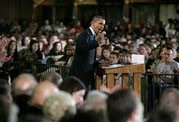After an action-packed seven days traveling the country with my students, I've made a much-anticipated return to Gallup and am happy to make my first posting in a week's time. I joined with chaperones and ten remarkably talented 4th/5th grade musicians from my school, Church Rock Academy Elementary in the great Navajo Nation, as we made a 2+ day train trip across the country to perform at the Smithsonian's National Museum of the American Indian.
To put it simply, the young stars rocked the house and dazzled the audience, which one NMAI staffer estimated featured 1500 excited onlookers, with an eclectic mix of Native American drums and flutes, Caribbean steel drums, as well as African djembe drums. As we toured the U.S. Capitol the following day (many thanks to the gracious and hospitable staff of Senator Jeff Bingaman's D.C. Office), I noted the wide eyes and even wider grins plastered onto my students faces and felt assured that our trip represented an experience they shan't soon forget. Making our way back across the Great Plains, I delighted in listening to my students describe how they missed (and, now more than ever, appreciated) their homes in Northwestern New Mexico.

Now that the train has docked in Gallup and I'm well into a morning of much-needed relaxation, it's great to have an opportunity to share some thoughts on the latest breaking political news and commentary dominating our country's electoral dynamic as we move toward November. With that said, let's jump right in and cover some of the upcoming events in Presidential Election '08, as well as shed light on the mouth-watering scenario unfolding around Democratic nominee Barack Obama's possible pick for a running mate. Off we go!
Obama Hopes to Build New Connection with Blue-Collar Workers:
This week, newly-anointed Democratic presidential nominee Barack Obama takes his show on the road, campaigning in a number of swing states, whose outcomes will be critical to the outcome of Election '08. Having struggled to capture many of these states in his recently concluded primary contest against Democratic rival Hillary Rodham Clinton, the Illinois Senator is keen on strengthening his ties to blue collar and industrial workers that will play a major role in deciding key battleground states like Ohio, West Virginia, North Carolina, Kentucky, and Michigan, to name just a few. While eyeing the Democratic-trending U.S. Southwest for important electoral pick-ups, pressuring McCain in the Heartland is seen by the Obama Campaign as one possible route to attaining an Election Day mandate.
Obama’s
Obama’s alleged 'problem' in capturing the support of this demographic is skin-deep and has less to do with any shortcomings in his specific policy prescriptions and more to do with a lack of familiarity between him and labor communities that maintain close ties to, and a strong affinity for, the Clintons, under whose administration they enjoyed relative economic prosperity in the 1990s.
Interestingly, it was Hillary’s husband, Bill, whose spirited endorsement promoted and ultimately secured passage of the North American Free Trade Agreement, which, perhaps more than other legislation of its kind, has led to a flood of manufacturing jobs away from cities like
NAFTA Hurt Obama in
NAFTA’s effect on the
Hillary Clinton’s desire to distance herself from her husband’s intimate ties to NAFTA's passing were quite apparent on the campaign trail in Ohio, the state on whose primary the trade pact had perhaps the most profound impact. She rounded up surrogates that held high-ranking policymaking positions within Bill's administration to bolster statements that she always harbored misgivings toward NAFTA, all the while chiding Obama for his alleged double talk on the agreement.
Criticisms of this variety came to a fore when her campaign pounced on statements made by a leading Canadian official, who claimed that high-ranking Obama advisers told him in a closed-door meeting that the candidate’s rhetoric lambasting NAFTA represented little more than political posturing designed to court the backing of voters in Ohio’s industrial pockets, for whom the trade deal had come to represent a political swear word. While it is unclear how much of an impact this back-and-forth had on the election's outcome, Clinton enjoyed one of her finest hours of the primary campaign in Ohio, capturing the Buckeye state by more than 10 points.
The Timing is Right: Obama Should Set the Story Straight on Economic Proposals
With Obama’s primary defeats in 
What has been lost in the short-sighted, ill-willed rhetoric that characterized much of the criticism coming at Obama during the primary season was that he is more of an economic realist than any either Clinton or his general election opponent, Arizona Senator John McCain.
For example, as skyrocketing global oil costs for oil sent domestic gas prices through the roof, Clinton and McCain engaged in a dose of political populism designed to score points with cash-strapped voters and give them a one-up on the Illinois Senator. Each called for a so-called ‘gas tax holiday’, which would remove the Federal tax on gasoline. Noting that the tax constitutes only a small portion of the per-gallon costs consumers pay at the pump, Obama denounced the holiday as unable to solve the country’s long-term energy crisis or provide lasting relief to the budgets of low- and middle-income families.
Moreover, Obama rejected the gas-tax holiday as a political stunt, claiming that a broader approach to our country’s energy needs is necessary in order to provide individuals with real, sustainable economic hope. The gas-tax holiday rebuff offers just one example of Obama’s unwillingness to compromise long-term economic prosperity for short-term political gain- exactly the type of foresight and strength of mind required of an effective head of state.
On Economy, Obama Offers Progress, not Platitudes:
In order to spur the type of sustainable, comprehensive economic advance that our country so badly needs, Barack Obama has constructed a comprehensive strategy that takes into account numerous issues and factors in the critical impact on our economy of topics ranging from climate change to international political stability.
This week, he takes this plan to the heartland of our country’s political dynamic, discussing with voters the important roles the government and general public will both have to play, as well as sacrifices they'll have make, in order to place our economy back on a track to prosperity.
However, he will also challenge citizens to do their part to curb climate change and reduce the
Tax Relief for the Middle Class:
Obama has also proposed slashing the Bush tax cuts for the most wealthy U.S. earners and ushering in an era of relief for low- and middle-income workers. Specifically, the Obama plan would call for an immediate $250 tax rebate for more than 150 million working Americans, and, if economic conditions continue to worsen, an additional $250 cut would be issued. Putting money back into the pockets of working class citizens taxpayers would help them through trying economic times and ensure that family budgets are not stretched to the point of explosion.
Moreover, Obama pledges to provide seniors, whom, research suggests, are those citizens most likely to reinject added income immediately back into the economy through increased spending, with a one-time $250 supplement to their monthly social security check. Doing so would go a long way in ensuring that seniors living on fixed incomes have the cash-boost necessary to help them through difficult times, as well as aiding the domestic economy by encouraging increased spending in U.S. businesses.
Fair Trade:
On trade, President Obama would put competitiveness back into the U.S.'s trade doctrine. Under the Bush Administration's damaging proposals, foreign markets have been opened to the benefit of U.S.-based multi-national executives, while opening domestic markets to the detriment of hard-working Americans. While expanded free-trade lowers the costs of consumer goods for working class folks, domestic workers should not be forced to compete with laborers abroad whose government's give little credence to the importance of internationally-recognized labor and environmental standards.
President Obama, in each trade agreement, would ensure that our trading partners are meeting their pledges to the International Labor Organization in terms of providing worker rights on pay and organization, as well as meeting global environmental regulations. He would also provide more meaningful 'trade adjustment assistance' to U.S. workers whose jobs are lost due to outsourcing. Current TAA programs are underfunded and do not provide help to those folks whose jobs were lost as a result of outsourcing to countries with whom the U.S. does not have a free trade agreement (FTA). Obama's plan fixes that and would help sacked domestic employees acquire the skills necessary to seek and obtain gainful employment, even if their jobs were moved to a country that does not have an FTA with the U.S.

The last thing those of us who have felt the crunch of the current economic contraction need is political posturing from ambitious politicians. What we do need, though, are real solutions and the type of bold, charismatic leadership required to reify them. Barack Obama offers that leadership, and, in the weeks and months ahead, his support amongst voters from all across the country will bear this out.

No comments:
Post a Comment